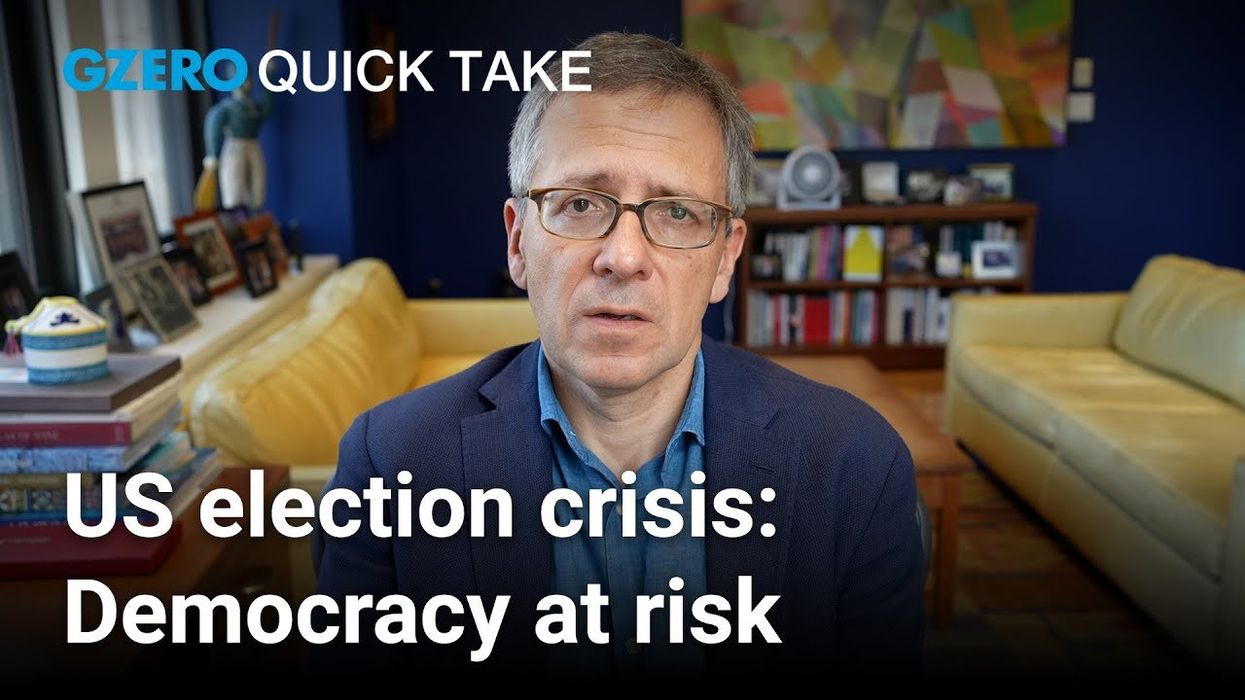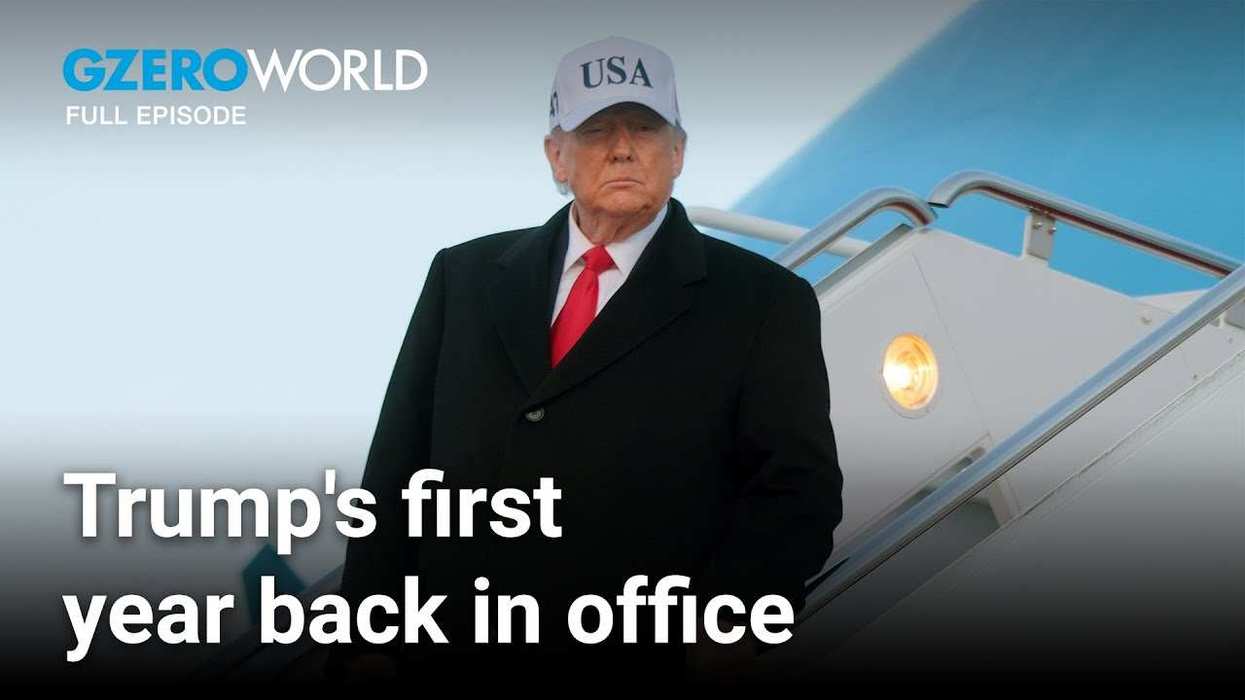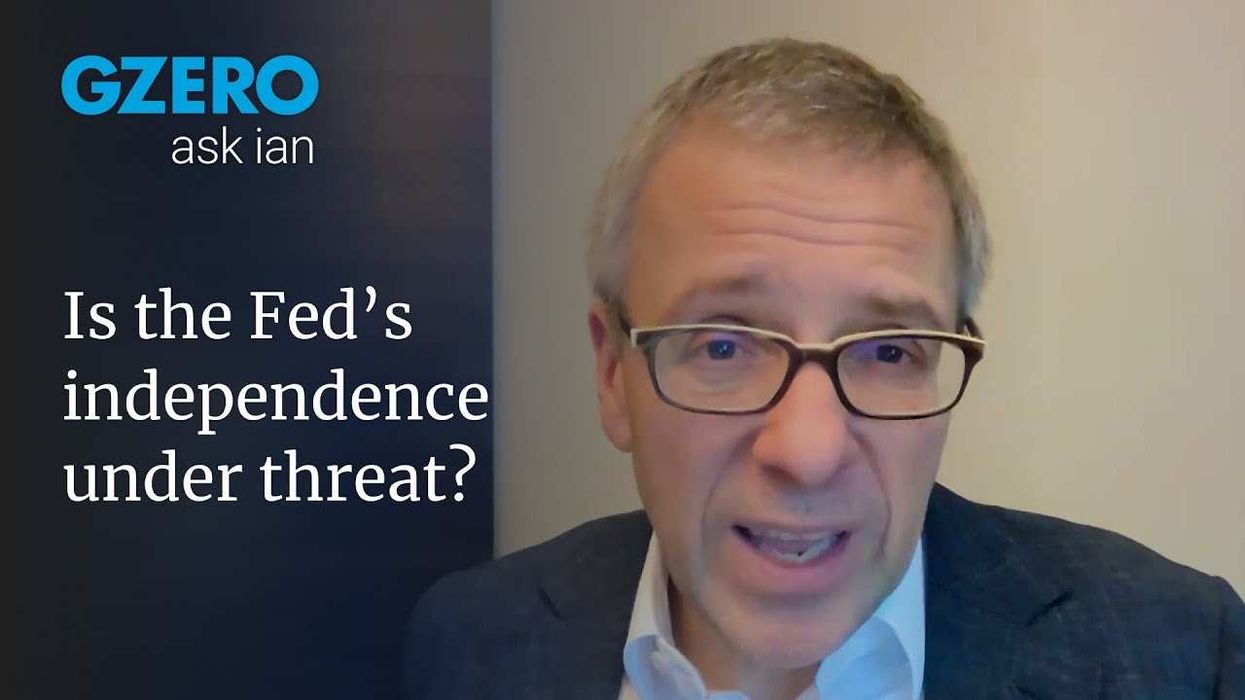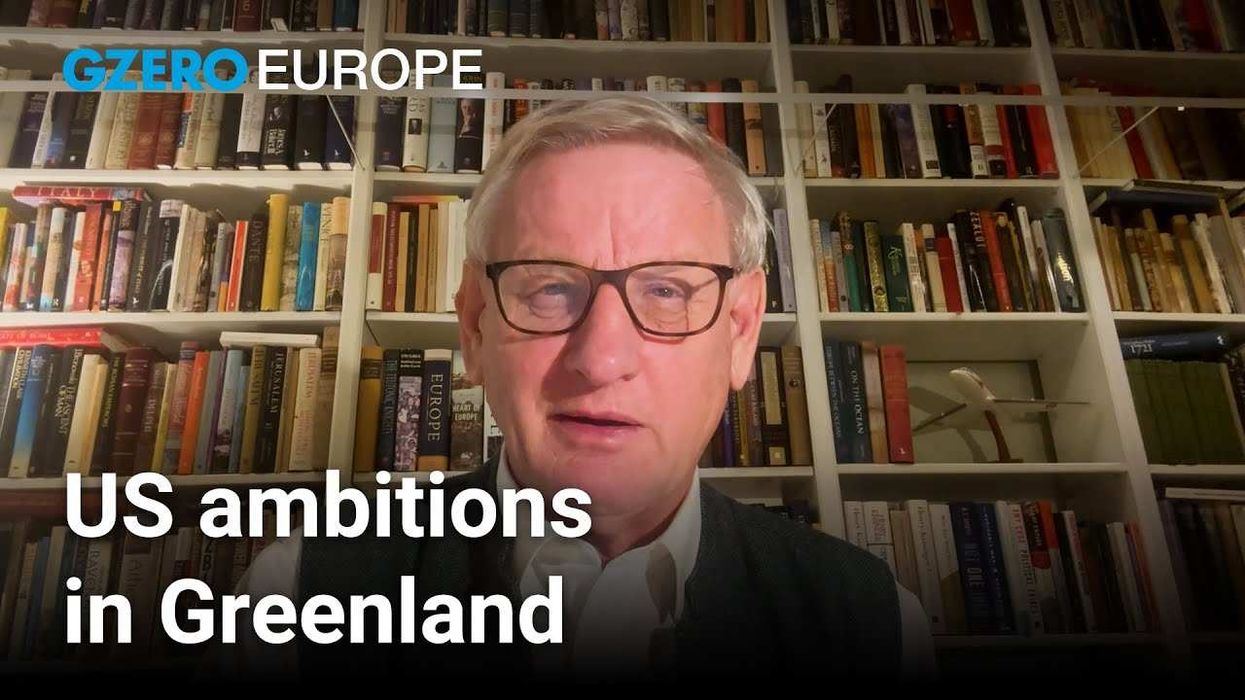VIDEOSGZERO World with Ian BremmerQuick TakePUPPET REGIMEIan ExplainsGZERO ReportsAsk IanGlobal Stage
Site Navigation
Search
Human content,
AI powered search.
Latest Stories
Sign up for GZERO Daily.
Get our latest updates and insights delivered to your inbox.
Top Risks of 2026
WATCH RECORDING
Ian Bremmer's Quick Take: Hi, everybody. Ian Bremmer here and a Quick Take to kick off your week. I want to talk about US elections and democracy.
This has been the year 2024 of elections all over the world. And most of them are going just fine. I mean, pretty much almost all of them. Okay, Russia is not a democracy. So you shouldn't really talk about elections because it's not like the people actually have a choice. It's Putin or it's Putin. But everywhere else, we've had elections that are free and fair and peaceful, and they've led to stable transitions, whether they're voting people out, or whether they're clipping their power or whether they're doubling down on them. And that's been true in Indonesia and Mexico and South Africa, India, the European Parliament. And soon it will be true in the coming weeks, first in France and in the United Kingdom. So it's not like democracy all over the world is in crisis or is about to fall apart. It's not like most countries can't have normal elections.
But the United States is an outlier. it's of course, the most powerful country in the world, but it's also the most dysfunctional major democracy. It's a democracy in crisis, and it's getting worse. In 2020, of course, there was an election that was very seriously contested. Former President Trump claimed the vote was rigged. It wasn't. But he continues to push forward that narrative. And it has been supported by pretty much the entire Republican Party leadership because he's in charge of the party and as a consequences believed by a strong majority of Republican voters. That is unique among advanced industrial democracies.
And indeed, you see Trump continuing to say the only way the election could be legitimate this time around is if he wins. If he loses, it's obviously rigged. That's clearly problematic for a former president and a presidential candidate in a democracy. But it's worse than that because this time around, you have questions of legitimacy that are beyond the vote, but about the nature of the election itself. Trump's view, whether he believes it or not, is sort of immaterial, but certainly it's what he is promoting, is that the indictments against him, the criminal cases against him, now the 34 convictions against him are politicized by the Democratic Party, by President Biden to make it impossible for him to win a legitimate election. In other words, using the political power of the incumbent party and leadership to delegitimize the election.
That's what he's saying. Again, it's not true, but to the extent that that is the case that implies that, if Trump loses, it's not just because of a rigged vote, it's because of a rigged system. It's because, you know, he was undermined by these illegitimate cases, by the criminalization of the entire judiciary, the capture of the one branch of government by another branch of government, and it's politicization. So that that's the way that Trump is running, Biden is running, saying that Trump is a clear and present danger to democracy, that the country could become authoritarian, that you could lose your democracy if he becomes president. So everything is at stake.
And also the fact that he has been impeached twice, the fact that he has faced these indictments, including convictions, means that he is illegitimate, shouldn't be allowed to run for president, never mind be elected president. That is the Democratic view that Trump is not legitimate as a candidate. So it goes beyond who wins the vote.
It's the reality that Trump and Biden are now portraying the other as illegitimate in terms of the way that the election is being conducted itself. The very reality of a democratic election in that regard no longer holds for the messaging coming from the Democratic and Republican leadership. So is this about Trump? And the answer is only partially, he is a major symptom of the dysfunction and the crisis that US democracy is presently facing.
But it is also very important to recognize a deeper problem, which is that, many Americans believe that their country, my country, is no longer a representative democracy. That powerful, moneyed, special interests, across the board, whether we talk about the defense complex or, pharmaceutical companies or big finance or, you name it, the NRA or the teachers lobby or the police lobby or you name it, that powerful interests are able to capture the political system policies, the regulatory system, and ensure that government does not reflect the interests of the average American.
And it is true that the US is far more captured by special interests. And you see this with the Citizens United ruling by the Supreme Court. You see this with the ungodly amount of money that goes into campaigning for American elections from the presidency all the way down to the House of Representatives. You see this across the board in the way policy can and cannot be made in the United States.
And this is why you have people talking about a uniparty or the blob in foreign policy or even the deep state. And a lot of this is conspiracy theory, and it's certainly not true that there was a shadowy group of people that are actually forming, you know, sort of policy and controlling the president. But the reality, in a sense, is more disturbing than that. It is that the system is so structurally weak and so controlled by money and power of people that are not voted for office that it feels like an non-representative, non-democracy to large numbers of Americans who no longer share the values that America was founded on. They don't see that the country reflects that.
And to the extent the US is unique among G7 countries in being unrepresentative in governance of its people, you see a lot of that in Trump support, that people out there want someone who is angering the establishment, angering the mainstream media, someone that says he's going to break the system, he's going to bring a corrupt system to heel. And certainly you see a little bit of that in Trump's stated policies, like on wanting to end wars, for example, and why Trump doesn't support free trade and instead wants more subsidy, more industrial policy in the US, Trump's China policy, which precedes Biden's China policy but is largely similar, focused much more on that. But of course, it's also true that Trump's “drain the swamp” mantra only makes sense if you don't look at a lot of Trump's domestic policies.
I mean, Trump was the leader in my life who was most aligned to ensuring that rich people get richer, was most aligned with big finance and hedge funds and major corporations and big oil and fast food and manufacturing and, you know, pro-dumping all of these things. I mean, you look at his cabinet with Sonny Perdue as the secretary of agriculture, and Elizabeth DeVos as the secretary of education, and on and on and energy and treasury and you name it.
What you see the reality of Trump's cabinet was the swampiest, of pro special interests, pro very powerful people. And that's why Trump was so welcomed when the Business Council last week invited him to go and speak, as soon as he said yes, (and Biden was invited too, didn't make it, sent an representative), immediately far more CEOs, went to watch. Why? I mean, one, because they want to make sure that they're connected with someone who can be president. But two, because a lot of Trump's policies, will benefit the wealthiest and the most powerful people in the country. And so in that regard, you know, Trump can throw things like, you know, build the wall, identity politics, anti-DEI. But the reality is that the most powerful will do the best, at least in the short term. Under a Trump administration, that's the revealed preference we've seen, with the alignment that he has with those that give the big money.
So, anyway, that is a little bit for me, a little bit of the state of democracy is challenged as it is. I'm not looking forward to this election, in part because it's horrible to see your country go through this identity crisis and not align itself with the values that I think a lot of people around the world, and a lot of people in the US would like to see America do a better job with. That's it for me, and I'll talk to you all real soon.
Keep reading...Show less
More from Quick Take
Europe takes control of Ukraine’s future
December 15, 2025
Trump’s new national security strategy targets Europe
December 08, 2025
Trump, Russia, and a deal Ukraine can’t accept
December 02, 2025
Europe divided as US pushes Ukraine-Russia peace deal
November 24, 2025
Trump escalates sanctions against Russia
November 10, 2025
Is Abu Dhabi becoming the global capital of AI development?
November 02, 2025
What the Trump-Xi meeting means for US-China relations
October 30, 2025
Trump’s East Wing demolition, Binance pardon, and tariffs on Canada
October 27, 2025
Trump brokers peace: Hostages freed and guns fall silent in Gaza
October 13, 2025
Trump's role in brokering Israel-Hamas deal
October 09, 2025
America’s short-term wins vs. long-term risks
October 06, 2025
Israel is facing real consequences over Gaza annexation plans
September 29, 2025
Is Israel risking global isolation over Gaza?
September 22, 2025
Charlie Kirk's assassination will make things worse in the US
September 15, 2025
Russia-Ukraine war escalation
September 08, 2025
China’s push for a new world order
September 02, 2025
Is the US preparing to strike Venezuela?
August 27, 2025
Is American capitalism still capitalism?
August 25, 2025
Zelensky, Trump, and NATO: A united front on Ukraine?
August 18, 2025
Trump and Putin to meet in Alaska to discuss Ukraine
August 11, 2025
US government rescinds West Point role for former cyber director
August 04, 2025
US-EU trade deal marks a win for Trump
July 28, 2025
The US, China, and the critical minerals question
July 21, 2025
Epstein conspiracies divide Trump's MAGA base
July 14, 2025
US-Brazil relations in crisis
July 10, 2025
Elon Musk vows to start a new political party
July 07, 2025
What Zohran Mamdani’s win really signals for US politics
June 30, 2025
Iran's retaliation shows strategic weakness
June 23, 2025
US enters war with Iran: What comes next?
June 22, 2025
Iran looks to negotiate ceasefire
June 16, 2025
Elon vs. Trump: Billionaire fallout goes public
June 06, 2025
Elon Musk steps down from Trump administration
May 29, 2025
Trump's weekend of geopolitical success
May 12, 2025
Can Trump and Carney reset US-Canada relations?
May 07, 2025
Trump’s ‘less is more’ message is un-American
May 05, 2025
Ian Bremmer on Trump's first 100 days
April 28, 2025
Trump’s America: A kleptocracy but not a police state
April 23, 2025
Inside the Harvard-Trump showdown
April 21, 2025
Can the US win by undoing globalization?
April 14, 2025
Who benefits from Trump's tariff wall?
April 07, 2025
Trump's tariffs & the end of globalization
April 03, 2025
Leaked Signal chat shows Trump team's mindset
March 26, 2025
What Trump team's war plans leak revealed
March 25, 2025
Is Europe in trouble as the US pulls away?
March 24, 2025
Putin-Trump Ukraine call is a small win for both sides
March 18, 2025
What will Trump offer Putin in Ukraine ceasefire talks?
March 17, 2025
Ukraine ceasefire deal now awaits Putin's response
March 11, 2025
Can Europe broker a Ukraine ceasefire?
March 03, 2025
What Trump-Zelensky fallout means for Ukraine war
March 01, 2025
Why the US-Ukraine minerals deal changed
February 26, 2025
Germany's close election limits its ability to lead Europe
February 24, 2025
Ukraine hopes for Europe's help as US negotiates with Russia
February 18, 2025
JD Vance stuns Munich conference with critique on European democracy
February 14, 2025
Trump-Putin chat over Ukraine "deeply" worries Europe
February 13, 2025
What is Trump's Gaza playbook?
February 10, 2025
Why cutting USAID will hurt American foreign policy
February 05, 2025
Why is Trump starting a trade war with Canada?
February 02, 2025
How Trump's assertive foreign policy impacts international relations
January 27, 2025
Trump's Davos address sets up big shifts in US strategy
January 24, 2025
From Davos: How global leaders are grappling with Trump’s return
January 20, 2025
Ian Bremmer on the forces behind the geopolitical recession
January 17, 2025
What Greenlanders might want from a deal with Trump
January 13, 2025
New Year's Day terror attacks highlight America's divisions
January 03, 2025
GZERO Series
GZERO Daily: our free newsletter about global politics
Keep up with what’s going on around the world - and why it matters.















































































